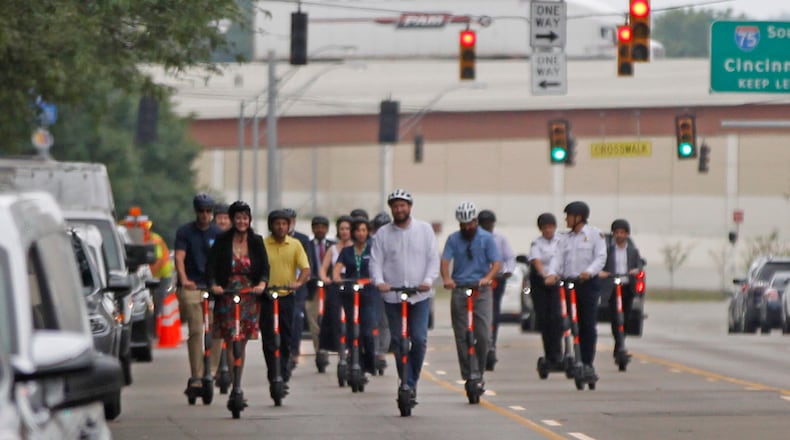Changes for the impaired were adopted by Kettering at the urging of the National Federation of the Blind of Ohio, which said the city addressed most of their concerns.
“They were one of the easiest cities I’ve ever worked with on any accessibility issues,” said Todd Elzey, treasurer of the Ohio group. “They were very interested and very willing to do it.”
The advocacy organization “came up with some pretty good” ideas, Kettering Mayor Don Patterson said. “They were happy with us working with them and making these modifications.”
Kettering last week joined Dayton – which approved them in 2019 - among area cities allowing the shared scooters.
They have been outlawed in Oakwood, which labeled “dockless electric scooters and bicycles” a “public nuisance.”
Centerville has introduced a measure to ban the scooters, but has taken no action since July. That city had earlier passed a 12-month moratorium, which expires in March.
Kettering also approved a moratorium until February 2022, giving city staff time to draw up guidelines for “residents to reap the benefits of such devices while limiting the risks,” records show.
The amount of Kettering’s application and permit fees will be “calculated based upon the fleet size requested and approved,” states city council approved legislation, which takes effect by Christmas.
The maximum number of devices “between all permittees” in Kettering would be 500, with the city having discretion to increase that total, according to the legislation.
Fleet size requirements would be at least 50 and a maximum of 100 for bikes/electric bikes or electric scooters operators, according to the proposal.
The range for permitted operators of a combination of those vehicles would be 50 to 150, documents state.
The ordinance also calls for the following:
•All operators must affix a tactile sign that identifies an operator’s name and contact information.
•All shared device program websites and apps must be accessible to blind individuals.
•Incorrectly parked devices must be moved within two hours. If it is a hazard, they must be moved immediately.
•Shared device riders on a sidewalk must disengage the motor and yield the rights of way to pedestrians, making an audible signal before overtaking and passing pedestrians.
The only unresolved issue for Elzey, he said, is that Kettering will allow the vehicles on sidewalks, which he said is “an issue with all biking regulations.”
“One of the issues with having these things on sidewalks is they’re so quiet, they go by without people hearing it,” Elzey said. “And often can scare people. It can be dangerous for seniors, dangerous for people with hearing loss”
About the Author

